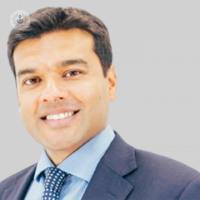What are the options available for vision correction?
Written in association with:When it comes to vision correction, modern medical advancements offer a plethora of options, and lens implants stand at the forefront of restoring clarity to our sight. As technology evolves, so do the choices available to individuals seeking to improve their vision through surgical intervention. From monofocal lenses to multifocal wonders, each type of lens implant caters to specific visual needs, providing patients with a customised approach to better vision. In his latest online article, Mr Venki Sundaram gives us his insights.

Monofocal lenses
Among the array of lens implants, monofocal lenses stand as a dependable option, offering a fixed focusing power that primarily aids in distant vision. Patients implanted with monofocal lenses typically experience clear vision for objects at a distance, reducing reliance on glasses for activities like driving or watching television.
However, it's essential to note that while monofocal lenses excel at distance vision, they usually necessitate the use of reading glasses for tasks requiring close-up focus, such as reading or using a smartphone.
Enhanced monofocal lenses
Recognising the need for versatility in today's visually demanding world, enhanced or premium monofocal lenses step in to bridge the gap between distant and near vision. These lenses offer excellent clarity for objects both far and in the intermediate range, making them particularly beneficial for activities like working on a computer or seeing a car dashboard.
While enhanced monofocal lenses provide an enhanced visual experience, some patients may still require reading glasses for tasks requiring close-up focus or small print.
Multifocal lenses
For those seeking freedom from glasses for tasks at various distances, multifocal lenses present an innovative solution. These lenses incorporate different focusing powers within them, enabling wearers to enjoy clear vision across a range of distances, from far to intermediate to near.
While multifocal lenses offer unparalleled convenience, it's essential to acknowledge that they may not be suitable for everyone and can potentially introduce quality issues, such as halos or glare, especially in low-light conditions. Therefore, thorough discussion with a healthcare professional is crucial before opting for multifocal lens implantation.
Toric lenses
Addressing the additional challenge of astigmatism, toric lenses emerge as a specialised solution for individuals with moderate to high astigmatism. These lenses reduce the need for distance glasses post-surgery, providing enhanced clarity for distant objects. However, similar to other lens options, patients may still require reading glasses for tasks requiring near vision.
Mr Venki Sundaram is an esteemed consultant ophthalmologist. You can schedule an appointment with Mr Sundaram on his Top Doctors profile.


